Interview with 2D awarded graphics artist Thierry " Barontieri " Doizon
need translation?Japanese
1. Could you briefly tell us in the beginning how long you have been engaged in your creation and what your beginnings were like?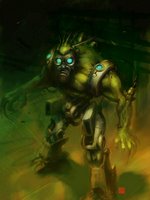 It’s difficult to say when it all started but, as I never stopped drawing and concepting, I grew up in Madagascar and always tried to make arrow guns for fishing, Alien spacesuits and plenty of funny stupid things (read Calvin and you’ll understand). I graduated in arts and literature in Africa and went logically back to France to learn Industrial Design. After my studies I found a job in Videogames and applied the techniques used in Product Design and Interior Architecture to the process of making games. So like a lot of artists I started with my pencils, paintings and especially markers, then came the Digital era, making things easier and faster. When you think about the time we spent on paper to realise the same stuff that we do now with a PC it’s just insane. 10 years ago I had a crazy library, and spent all my spare time in bookshops to find nice and cheap references… now we have internet! It’s Magical!!! Nowadays there are a lot of forums for concept artists showing images, tutorials and techniques, it’s a real pleasure to share our experience with the new generations, it’s something I would have loved to get a decade ago.
It’s difficult to say when it all started but, as I never stopped drawing and concepting, I grew up in Madagascar and always tried to make arrow guns for fishing, Alien spacesuits and plenty of funny stupid things (read Calvin and you’ll understand). I graduated in arts and literature in Africa and went logically back to France to learn Industrial Design. After my studies I found a job in Videogames and applied the techniques used in Product Design and Interior Architecture to the process of making games. So like a lot of artists I started with my pencils, paintings and especially markers, then came the Digital era, making things easier and faster. When you think about the time we spent on paper to realise the same stuff that we do now with a PC it’s just insane. 10 years ago I had a crazy library, and spent all my spare time in bookshops to find nice and cheap references… now we have internet! It’s Magical!!! Nowadays there are a lot of forums for concept artists showing images, tutorials and techniques, it’s a real pleasure to share our experience with the new generations, it’s something I would have loved to get a decade ago.
2. What are your favourite styles? Do you prefer fantasy, scifi, realism … ?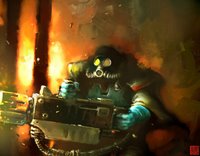 My favourite universe is definitely what we call now Steam Punk, a twisted version of the early 20th century where everything could be possible, not so much technology yet but a lot of atmosphere, pipes, steam and leather, I definitely love that! But it’s good to work on Scifi and Fantasy too, I mean everything which is not just our boring reality. My job consists of creating and bringing something original for the audience and gamers, hopefully something to make them dream.
My favourite universe is definitely what we call now Steam Punk, a twisted version of the early 20th century where everything could be possible, not so much technology yet but a lot of atmosphere, pipes, steam and leather, I definitely love that! But it’s good to work on Scifi and Fantasy too, I mean everything which is not just our boring reality. My job consists of creating and bringing something original for the audience and gamers, hopefully something to make them dream.
3. Which of your projects do you recall best and why? Few years ago, I worked on a project named Quark (Quantic Dream), it was an 8 months preproduction for a game that never came out, but we did a very interesting job to create a fantasy world with its own customs, culture, religion, biodiversity and ethnies. It was a great experience!
Few years ago, I worked on a project named Quark (Quantic Dream), it was an 8 months preproduction for a game that never came out, but we did a very interesting job to create a fantasy world with its own customs, culture, religion, biodiversity and ethnies. It was a great experience!
4. Could you describe your usual inspiration before you start working?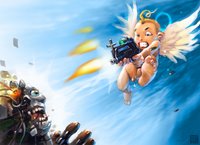 It does depend on the project really, because sometimes we need a lot of historical and cultural references, sometimes it has to be more creative and personal. What inspiration means by the way? Emotion, experimentation, action, intuition, influence...? Difficult to say right, it’s also difficult to be always inspired. That’s what makes a concept artist unique for me; not only his technical skills but mainly his creative potential, and how he will manage to renew and emulate his inspiration with time… and we all have our secrets for that!
It does depend on the project really, because sometimes we need a lot of historical and cultural references, sometimes it has to be more creative and personal. What inspiration means by the way? Emotion, experimentation, action, intuition, influence...? Difficult to say right, it’s also difficult to be always inspired. That’s what makes a concept artist unique for me; not only his technical skills but mainly his creative potential, and how he will manage to renew and emulate his inspiration with time… and we all have our secrets for that!
5. Do you usually think well the procedure of work before you actually start working, or do you improvise?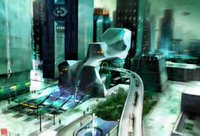 Again, the process depends of the project, if it’s a speedpainting for a forum then I’ll start with an idea and go with the flow for an hour… just having fun! If it’s for a freelance job then I usually have some constraints and things are easier in a framework and tight deadlines. If it’s for a game we have a game design document and a description of characters, environments and objects. I like to discuss a lot with designers before starting sketches, but for a personal project I like to go wild first and think afterwards, so the procedures are always different. It’s very important to adapt yourself to any given situation.
Again, the process depends of the project, if it’s a speedpainting for a forum then I’ll start with an idea and go with the flow for an hour… just having fun! If it’s for a freelance job then I usually have some constraints and things are easier in a framework and tight deadlines. If it’s for a game we have a game design document and a description of characters, environments and objects. I like to discuss a lot with designers before starting sketches, but for a personal project I like to go wild first and think afterwards, so the procedures are always different. It’s very important to adapt yourself to any given situation.
6. What is important for the result to be of high quality?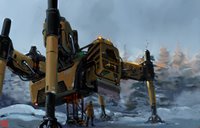 Quality is very difficult to describe, as long as you are honestly happy with your work it should be fine, but as a freelance artist I’ve seen many times my customer being amazed by my less interesting sketches. So, high quality is just a matter of taste.
Quality is very difficult to describe, as long as you are honestly happy with your work it should be fine, but as a freelance artist I’ve seen many times my customer being amazed by my less interesting sketches. So, high quality is just a matter of taste.
7. What software is your favorite?
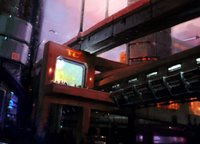 Without hesitation Photoshop CS, but sometimes I like to use Painter, it has a different feeling to it. Now I start to use Digital Fusion because I always liked images, and a film is a succession of still images… special effects are a very exciting new field.
Without hesitation Photoshop CS, but sometimes I like to use Painter, it has a different feeling to it. Now I start to use Digital Fusion because I always liked images, and a film is a succession of still images… special effects are a very exciting new field.
8. What methods of work do you prefer and why?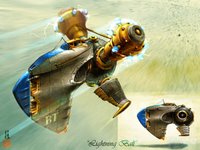
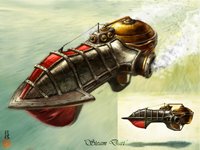 No preferred methods so far, I just try to use the most efficient one depending of the situation. In fact experimentation and experience are the keys to determine my choice.
No preferred methods so far, I just try to use the most efficient one depending of the situation. In fact experimentation and experience are the keys to determine my choice.
9. What methods of work do you usually avoid?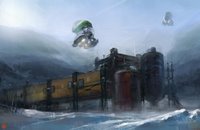
It’s a good idea to avoid a method you are not familiar with especially on overtime.
10. What is the significance of details in individual parts in the image?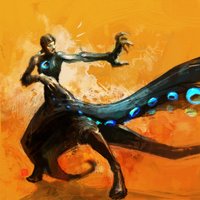 It’s relative, my style is very influenced by speed paintings, I like paintings with a lot of spontaneity, and photorealism isn’t my cup of tea. Details are there only to emphasize the subject, to express a situation or to drive the eyes, but too many details can kill your composition.
It’s relative, my style is very influenced by speed paintings, I like paintings with a lot of spontaneity, and photorealism isn’t my cup of tea. Details are there only to emphasize the subject, to express a situation or to drive the eyes, but too many details can kill your composition.
11. When one takes a look at an image, the choice of colours influences the feeling and the overall sensing the outcome. What is important, in your opinion, in doing so and what procedures do you employ for the result to be in good harmony of colours?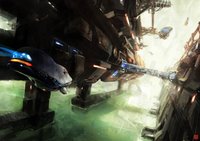 Ahaha… colours; interesting subject! As you notice my art is very colourful, I don’t hesitate to put bright crazy oranges or blues or pink! In fact if the picture hurts my eyes it’s a bad sign, since I can handle it, I’ll push the limits. Harmony is also a question of taste so I try to be happy with my images and the rest will follow naturally. I would advise everyone to have a strong knowledge of colours, texture, shapes, contrasts and composition.
Ahaha… colours; interesting subject! As you notice my art is very colourful, I don’t hesitate to put bright crazy oranges or blues or pink! In fact if the picture hurts my eyes it’s a bad sign, since I can handle it, I’ll push the limits. Harmony is also a question of taste so I try to be happy with my images and the rest will follow naturally. I would advise everyone to have a strong knowledge of colours, texture, shapes, contrasts and composition.
12. Lights and shadows are very important for the resulting composition. How do you feel about this part of your creation?
This is certainly the most important thing in fact; the contrast between light and shadows affects your composition and all your creations. It’s not just the framing but a whole subtle relation between values and shapes to create illusion, this blend of techniques and medias will then find its sense in the perception of the viewer… that’s where you have to find the right balance. A good composition is a solid foundation of all paintings, the rest is just cosmetic.
13. By way of conclusion, can you tell us something about your plans and ambitions as to your work in the future?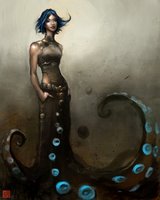
I’d like to work for movies, but I have no plan for the future yet, let’s see!
Griffu tutorial
Octomodel tutorial
Thanks a lot to Barontieri for interview.
Source: www.graphic-tutorials.com
Labels: English, interview, Thierry Doison
 " title="Interview with 2D awarded graphics artist Thierry " Barontieri " Doizon">Sunday, March 06, 2005
" title="Interview with 2D awarded graphics artist Thierry " Barontieri " Doizon">Sunday, March 06, 2005<< HOME

